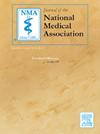T Cell–Redirecting Therapies in Multiple Myeloma: Exploring Barriers Across the Patient–Physician–Caregiver Spectrum
IF 2.3
4区 医学
Q1 MEDICINE, GENERAL & INTERNAL
引用次数: 0
Abstract
Background
T-cell-redirecting therapies (TCRT), including CAR T-cell and bispecific antibodies offer promising advances for relapsed or refractory multiple myeloma (MM). However, their adoption in real-world settings remains limited. Patients and caregivers often lack awareness of these therapies, while community physicians face barriers related to referral logistics, evolving treatment protocols, and limited access outside of academic centers.
Methods
This study assessed awareness, perceived barriers, and practical challenges surrounding TCRT among patients with MM, their caregivers, and community physicians. In June 2025, we distributed IRB-approved, anonymized, cross-sectional REDCap surveys at Atrium Health Wake Forest Baptist Comprehensive Cancer Center. The surveys were internally developed and reviewed for content validity. They were distributed to three stakeholder groups: patients with multiple myeloma (25-item survey), caregivers of patients receiving TCRT (22-item survey), and community-based physicians practicing without direct access to TCRT (21-item survey). Surveys explored familiarity, perceived risks and benefits, access issues, referral practices, and informational needs. Descriptive statistics were used to analyze response trends.
Results
As of 6/18/2025, 358 respondents had initiated the surveys, including 291 patients, 38 caregivers, and 29 physicians. Among patient respondents 16.73% were black, 80% white, 1% Asian and 2% other. Of 267 patients who answered awareness questions, 29% were unfamiliar with TCRT. Lack of awareness was higher among Black patients (38%) compared to others (27%), and among those with a high school education or less (44%) versus those with higher education (26%). No racial differences emerged regarding concern about clinical trial participation (27% Black vs 26% other).
Among caregivers, 23% reported no prior knowledge of TCRT. Most (59%) experienced mental or emotional impacts from caregiving, and 65% reported moderate to high emotional stress during the patient’s TCRT. Emotional distress was the most cited challenge (59%), followed by coordinating and attending appointments (33%) and isolation from family, friends and community (30%)
Among physicians, 10% were unfamiliar with TCRT. A majority (59%) identified location as a key barrier to access, and half recommended improved transportation or logistical support for patients as the primary solution.
Conclusion
Updated survey data will be provided for the poster presentation. Patients, caregivers, and community physicians face distinct yet intersecting challenges. We hope to further identify targeted opportunities to enhance TCRT education, care coordination, and stakeholder engagement across all groups.
多发性骨髓瘤的T细胞重定向治疗:探索跨越患者-医生-护理人员谱的障碍
t细胞重定向疗法(TCRT),包括CAR - t细胞和双特异性抗体,为复发或难治性多发性骨髓瘤(MM)提供了有希望的进展。然而,它们在现实环境中的应用仍然有限。患者和护理人员往往缺乏对这些疗法的认识,而社区医生面临着与转诊后勤、不断发展的治疗方案以及学术中心以外的有限准入相关的障碍。方法本研究评估MM患者、其护理人员和社区医生对TCRT的认知、感知障碍和实际挑战。2025年6月,我们在Atrium Health Wake Forest Baptist综合癌症中心分发了irb批准的匿名横断面REDCap调查。这些调查是内部开发的,并对内容有效性进行了审查。他们被分配到三个利益相关者组:多发性骨髓瘤患者(25项调查),接受TCRT患者的护理人员(22项调查),以及社区医生没有直接获得TCRT(21项调查)。调查探讨了熟悉度、感知风险和收益、获取问题、转诊实践和信息需求。采用描述性统计分析响应趋势。结果截至2025年6月18日,共有358人发起调查,其中患者291人,护理人员38人,医生29人。在受访患者中,16.73%为黑人,80%为白人,1%为亚洲人,2%为其他人种。在回答认知问题的267名患者中,29%不熟悉TCRT。黑人患者缺乏意识的比例(38%)高于其他人(27%),高中或以下学历的患者(44%)高于受过高等教育的患者(26%)。在对临床试验参与的关注方面,没有出现种族差异(27%黑人vs 26%其他种族)。在护理人员中,23%的人报告先前不知道TCRT。大多数(59%)经历了护理的精神或情绪影响,65%的患者在TCRT期间报告了中度至高度的情绪压力。情绪困扰是最常见的挑战(59%),其次是协调和参加预约(33%)以及与家人、朋友和社区的隔离(30%)。在医生中,10%不熟悉TCRT。大多数人(59%)认为地点是就诊的主要障碍,一半的人建议改善患者的交通或后勤支持作为主要解决方案。更新的调查数据将提供给海报展示。患者、护理人员和社区医生面临着不同但又相互交叉的挑战。我们希望进一步确定有针对性的机会,以加强TCRT教育、护理协调和所有群体的利益相关者参与。
本文章由计算机程序翻译,如有差异,请以英文原文为准。
求助全文
约1分钟内获得全文
求助全文
来源期刊
CiteScore
4.80
自引率
3.00%
发文量
139
审稿时长
98 days
期刊介绍:
Journal of the National Medical Association, the official journal of the National Medical Association, is a peer-reviewed publication whose purpose is to address medical care disparities of persons of African descent.
The Journal of the National Medical Association is focused on specialized clinical research activities related to the health problems of African Americans and other minority groups. Special emphasis is placed on the application of medical science to improve the healthcare of underserved populations both in the United States and abroad. The Journal has the following objectives: (1) to expand the base of original peer-reviewed literature and the quality of that research on the topic of minority health; (2) to provide greater dissemination of this research; (3) to offer appropriate and timely recognition of the significant contributions of physicians who serve these populations; and (4) to promote engagement by member and non-member physicians in the overall goals and objectives of the National Medical Association.

 求助内容:
求助内容: 应助结果提醒方式:
应助结果提醒方式:


